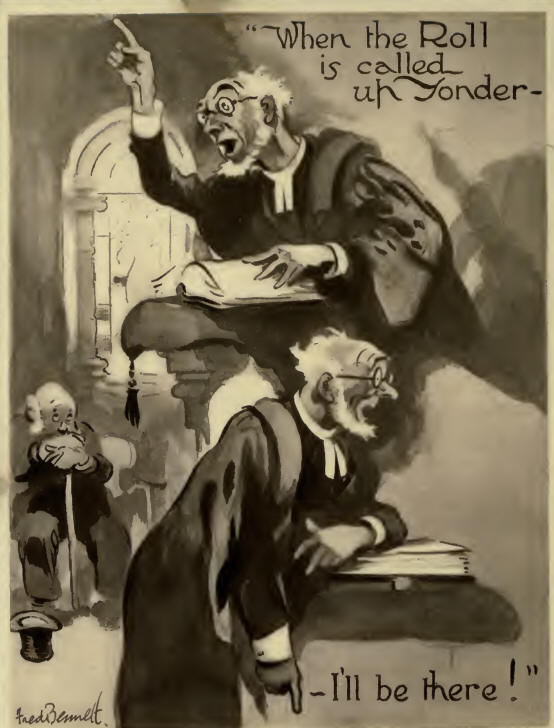
FOREWORD
“Speakin’ aboot ministers" said Sandy Soutar,—“We
werna speakin’ aboot ministers,” interrupted Mrs
Cunningham. “Ah weel,” remarked Sandy, “we generally
are!” This extract from a conversation, between
Sandy Soutar of Tullytassie and his friend Mrs
Cunningham of that ilk, gives, we think, ample
justification for the publication of this volume of
Canny Tales.
In Scotland, at all events, the "Meenister” is
always and everywhere a safe subject of friendly
gossip. Here will be found many a tale to his credit
and none at all to his discredit.
Should anyone see his own name immortalised here,
that is only an accident of accidents, for no living
person is purposely referred to in the book.
Allan Junior.
Some
time ago the B.B.C. favoured us with a broadcast by
an ex-convict. The item was very popular, and I have
every reason to believe it is to be followed up by
another from Peterhead, and that the life-timer who
is to broadcast is to begin with:—
“Good Evening Everybody! This is Peterhead
Penitentiary calling. We are in for a good time!”
Be that as it may, I feel sure we will not weary, as
we sojourn for a little in the presence of those
estimable gentlemen, the ministers of Scotland.
They are, on the whole, delightful company,
especially at soirees, where they often let
themselves go to a surprising degree!
The soiree as a matter of fact is the minister’s
night out. There he is expected to come off his
perch as it were, and forget the dignity of his high
office for a little while.
Whether or not this is due to a certain reaction of
a psychological nature, I cannot say, but there is a
story which proves that theologians are gifted with
more than the normal sense of humour.
A CHURCH HE WOULDN’T EMPTY.
It is to the effect that because a certain minister of the Scottish Kirk was guilty of emptying three churches in succession, the presbytery considered his case, and in order to put an end to the harm he was doing in that respect, appointed him to the chaplaincy of a prison. If that isn’t a sense of humour I don’t know what is!
A PRISON SERVICE.
Speaking about prisons, a fine story is told about a
chaplain who began the prison morning service with:—
“I am very glad to see you all here this morning!"
There was a pronounced titter amongst the prisoners
and he corrected himself with—“I beg your pardon
what I meant to say was, ‘I am glad to see that
despite the inclemency of the weather you are all in
your usual places.' We will begin the service with
the hymn:
“We
are travelling home to God
In the way our fathers trod.”
Then one of the prisoners stood up and exclaimed—“Excuse me Sir but I wont have that aspersion on the character of my dear father!”
INTO THE GANGES.
The
inmates of mental hospitals very often possess more
sense than they get credit for. For instance the
Rev. Mr MacLean was once intercepted on the main
drive on the way from a Sunday service. “Excuse me
Sir” said one of the patients, “but that was a grand
sermon you gave last Sunday.”
“I’m glad you liked it, what was it about again?”
questioned Mr MacLean.
“It was aboot thro win’ the bairns into the Ganges.”
“Oh yes I remember it—and what struck you about the
discourse?”
“I was winderin’ whit wey your mither didna throw
you in!”
DINNA GREET, MANNIE.
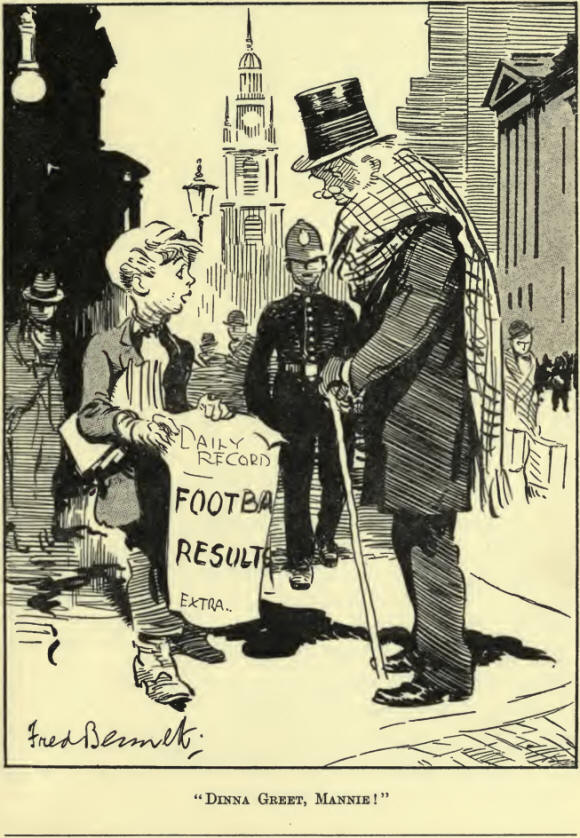
A minister in the west of Scotland was troubled with his eyes watering and his family doctor advised him to go to Glasgow Royal Infirmary for treatment. So one day he made up his mind to go. Arriving at Queen Street Station he questioned a newsboy regarding the way to the Infirmary. The little fellow gave him the necessary information and then looking up into his face remarked; “But dinna greet, Mannie, they’ll gi’e ye chloroform.”
WHEN THE ROLL IS CALLED.
Which
reminds me of another:—
A certain divine had only two gestures an upward and
a downward movement of the arm. Once he was
discoursing on “The Hereafter” and illustrated a
point with a quotation from a familiar hymn.
“The future” he said, “is a sealed book. The
hereafter is hid, as it were, by a veil. We know not
what a day may bring forth. But of one thing I am
assured,” he concluded, pointing upwards as he
spoke, “When the roll is called up yonder, I'11 be
there!”
Unfortunately for him his second gesture took the
downward direction as he finished the sentence.
ON CHURCH ATTENDANCE.
Ministers are often perturbed about the
non-attendance at the services. It would be
interesting to know on the other hand, the reasons
for going to church. For example there is the case
of Dauvit Blair. Dauvit had just come home and was
greeted by his better half with:—
“Was Mrs Macintosh at the kirk th’ day?"
“Aye” replied Dauvit.
“Did she hae on her new hat?”
“I didna notice!"
“Ye didna notice—You great big gomeril ye, what dae
ye gang tae the kirk for? Tae amuse yersel?”
THE SUFFERING POOR.
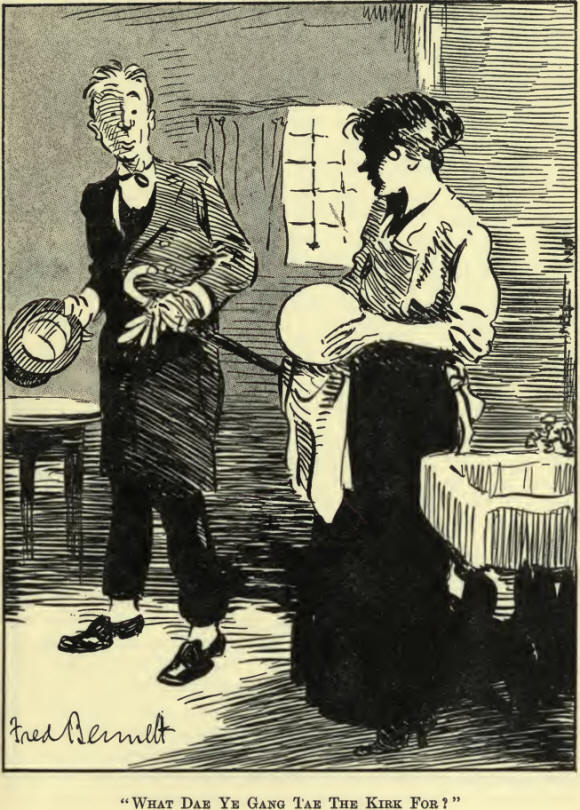
Here
is another example of unconscious humour; this time
at the expense of the minister’s better half.
The dear lady was going her rounds collecting for
the poor of the parish, at Christmas time. She was
tackling one of the hardest-hearted members of the
congregation, and he was endeavouring to find a way
by which he could get out of the necessity of giving
a subscription.
“I’m collecting for the suffering poor” she said,
“and shall be glad of your help.”
“Suffering poor?” he questioned, “are you sure that
they really do suffer?”
“I’m quite sure” she replied, "why, I go into their
homes and talk to them for hours on end.”
WHERE IS MY BOY TO-NIGHT.
Practical joking is not so popular as it used to be,
but now and again we get to hear of it.
An acquaintance of mine who was a bit of a wag in
his own way, was very popular as a speaker at social
meetings. Hearing of his gifts the Secretary of a
Y.W.C.A. prevailed upon him to take an evening
service on a Sunday. It was a great success, but the
young ladies have never forgiven him for choosing as
his first hymn that well-known one in Moody and
Sankey’s collection :—
“Where is my boy to-night.”
One can imagine their feelings as they sang the familiar lines, with only one man in the hall:—
“My
heart o’erflows
For I love him he knows,
Oh where is my Boy to-night?”
A DAISY!
That
it is possible to be humorous without meaning to be
is proved by this story:—
“A certain Scottish divine, noted for his corpulent
and massive figure was discoursing on the Marvels of
Creation. Waxing eloquent, he concluded with the
peroration:—‘The God who made the mighty ocean made
the wayside pool: the God who made the rolling
spheres made the tiny pebble on the beach: the God
who made the mighty mountains made the little grains
of sand,’ and then holding himself up to his full
stature he exclaimed:—‘The God who made me made a
daisy.’”
EPICTETUS.
Ministers on their visitations are often agreeably surprised at the erudition of their flock, but that appearances are sometimes deceptive is borne out by the story of the Fife minister who on paying a visit to one of his oldest members, a bedridden old man, saw a volume of Epictetus lying on the bed. “Dear me,” he exclaimed, taking up the book, “I did not know you were a Greek scholar. Do you use this book much?” “Use it” replied the old man, “I wadna be withoot it for onything. It’s the finest fly-swatter I ever had!”
THE PARROT STORY
A certain old maid had been presented with a parrot and after having it for a little time was very much surprised to find that it was in the habit of using very bad language. It grew so bad that one day she remonstrated with it and threatened to tell the minister. Next day the minister called and the parrot was introduced to him with—“Here’s the minister Polly.” Polly sat very still for a long time, eyeing the minister but saying nothing. At length the old lady approached the cage and said, “Are ye feart Polly?” With this the parrot bowed its head, turned up its eyes and replied in a subdued voice—“Aye.”
NO WANT OF ASSES.
A good story is told of a well known minister who is also a popular lecturer. The platform however is not the pulpit and certain observations caused constant interruptions on the part of a member of the audience who insisted on standing up and asking questions. At last the patience of the audience became exhausted and a second man stood up and shouted, “Sit doon ye ass!” With that a third man arose and shouted, “Sit doon the twa o’ ye, yer baith asses!” Then the lecturer intervened with “There seems to be no want of asses to-night —but one at a time please!” “A’ richt, you go on,” the cause of all the disturbance retorted, as he resumed his seat amid hilarious laughter.
A CHEERFUL GIVER.
Practical discourses do not always turn out as the
preacher desires. This is finely illustrated in the
following story.
The minister was anxious to inculcate the principles
of liberality in the heart of his son, so he gave
him a sixpence and a penny to take to church.
On the way home after the service the reverend
gentleman questioned the boy;—
“How much did you put in the plate to-day Johnnie?”
“A penny,” replied Johnnie.
“A penny,” exclaimed the minister, “why did you not
put in the sixpence?
“Well, father,” said Johnnie, “you told us last
Sunday that the Lord loveth a cheerful giver, and I
wasn’t at all cheerful about putting in that
sixpence.”
IN THE DOLOMITES!
The
following story, told of a certain Fife minister, is
worthy of more than local circulation. He had gone
to Austria for his annual holidays, and on his
return home met a kindly disposed member of his
congregation, who asked how he was keeping.
“I’m not at all well,” he replied, “I caught a cold
in the Dolomites.” When she got home she told her
husband she had met the minister. “He said he’s not
at all well, and that he caught a cold in the
Dolomites. What part of the body is that?”
THE MINISTER’S CHAMPAGNE
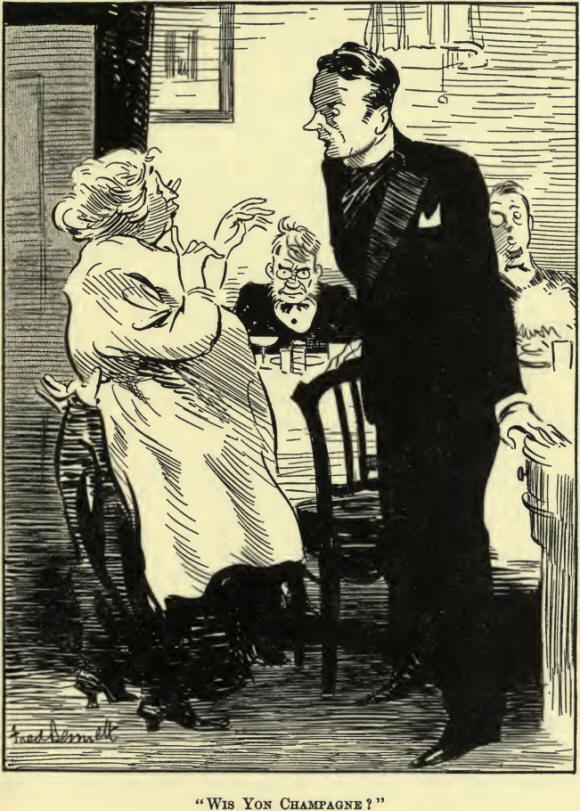
Bachelor ministers could tell some grand stories if
they would only let themselves go. The best one I
know concerns the minister who got three bottles of
champagne as a New Year Gift, and handed them to his
housekeeper for safe keeping.
Some weeks afterwards he had a few friends in for
supper, and asked the housekeeper to bring up a
bottle of champagne.
“Champagne Sir?” she queried.
“Yes,” he replied, “don’t you remember the three
bottles I gave you three weeks ago?”
“Wis yon Champagne? Mercy me, Sir, I thocht it was
sma’ beer, and had it wi’ my parritch, and I aye
windered hoo I wis aye sae cheery in the mornin’s!”
THE BEADLE AND THE SPIRITS.
Beadles, as a rule are gifted with a fine sense of
humour, but now and again they allow this gift to
overrun discretion, as in the story of the student
who was deputising for a month for the Parish
Minister.
“John" he said to the beadle, “I would like a glass
of water in the pulpit.” John supplied the needful,
and after the service, the student who was a bit of
a wag remarked: “It might have been spirits, for all
the congregation knew.” John smiled broadly, and
next Sabbath before commencing his discourse, the
student took his usual drink and was surprised to
find that it tasted of spirits. Beneath the tumbler
there was a slip of paper which read:—“I took the
hint Sir!”
UP AND DOWN.
Though kindly enough as a rule, beadles can be
brutally frank at times, especially in their
criticism of students who deputise for the regular
minister.
Take the story of the young fellow who had arrived
with a college reputation for brilliance—he had gone
up the pulpit steps with a jaunty and confident air,
as much as to say “Now they’ll hear a sermon!”
But somehow or other things went wrong and he made a
very poor show indeed, with the result that he came
down the steps in a very humbled spirit.
By way of advice, the beadle remarked, “My mannie,
if you’d gone up the way ye come doon, ye wad hae
come doon the way you gaed up!”
“THANKS” DISNA PEY ME.
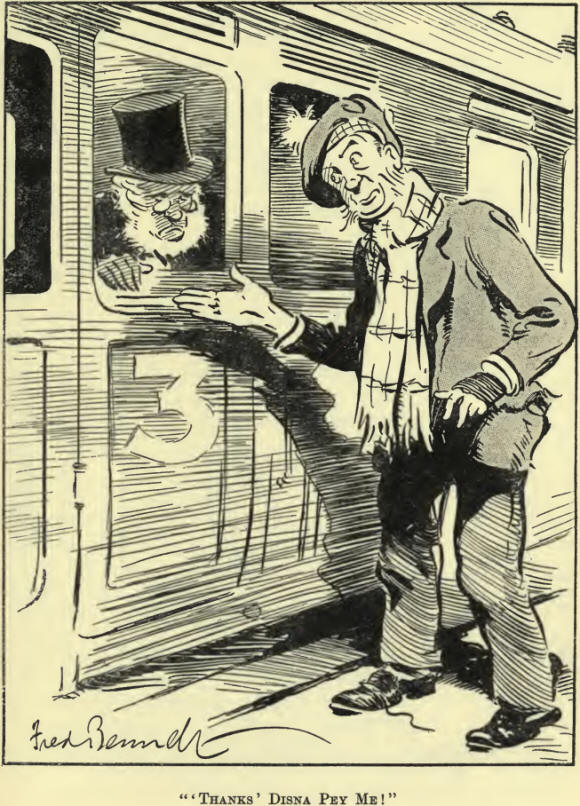
At the same time there is a pawky worldliness about beadles, which on occasion is very refreshing. For example, one worthy old beadle of my acquaintance was once asked to take a visiting minister’s bag to the station on the Monday morning. Tammas was there in good time, got the bag and accompanied the minister to the station. The train drew in; Tammas opened the carriage door and handed in the bag. “Many thanks!” said the minister. “‘Thanks' disna pey me,” said Tammas, “that’ll be saxpence.”
JEREMIAH’S SEAT.
There
is no denying that some ministers are extremely
tedious, and though the congregation can do nothing
to mend matters, sometimes a man arises with a
courage above his peers.
The sermon was on the Books of the Bible, and for
fifty minutes the minister expounded his views,
first on one book, and then on another until the
congregation began to show signs of fatigue. At
last, just as he seemed about to close he began
afresh. “We have examined the five great books of
Moses; we have sympathised with the patient Job; we
have revelled in the psalms of David; we have braved
the lions in their den with Daniel; we have been
cheered with Isaiah’s ‘rapt seraphic fire’; what
shall we now do with Jeremiah "
“Jeremiah can have my seat,” replied old John the
beadle, “I’m awa' hame.”
GET YOUR HAIR CUT.
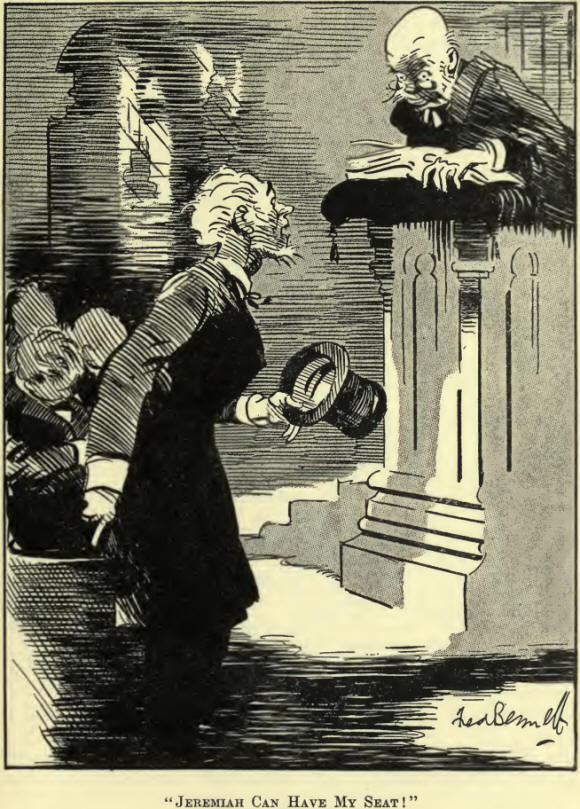
Giving advice is one of the easiest ways of serving others. It is also one of the cheapest, except in the case of lawyers. Sometimes however, the advice takes the form of a boomerang, and has the uncomfortable effect of striking back. Professor Blackie once found this out. In his day he was a familiar figure in Edinburgh and was often seen trudging along Princes Street with his long locks flowing in the wind. One day he was accosted by a boot-black with; “Shine your boots Sir?” The professor looked down on the little lad and eying his unkempt appearance said: “No, my boy, I don’t want my boots blacked, but I’ll give you a sixpence if you go and get your face washed.” The boy ran off to the nearest horse-trough; washed his face and returned for his reward. But just as the professor was in the act of handing over the sixpence the boy observed his flowing locks and drew back his hand with the remark; “Keep it yersel mannie, and get yer hair cut.”
PRECIOUS MOMENTS IDLY WASTED
Humorous situations are at times created by slips on the part of the preacher. I remember a rather amusing instance of this arising out of the intimation of the wrong number of a hymn. The organist, not noticing the mistake, played the first verse of the hymn as noted on the choir slips, and the choir followed suit. For some time the congregation fumbled with their books in a search for the hymn, when the minister stopped the singing with—“The correct number of the hymn is 390 at the fourth verse; “Precious moments idly wasted.”
THE BRAINS O’ A HEN.
One day the parish minister of Tullytassie was walking up the street when he saw two laddies fighting. Minister-like he walked up to separate them. “What are you two little rascals fighting about?” he asked as he seized one of them by the scruff of the neck. “We was fightin’ aboot you,” he replied. “Fighting about me,” said the minister, “whatever for?” But the answer left him guessing. “Boo-hoo, Boo-hoo, Johnnie Smith said ye didna hae the brains o’ a hen, and I said ye did.”
SPOILING THE ENJOYMENT.
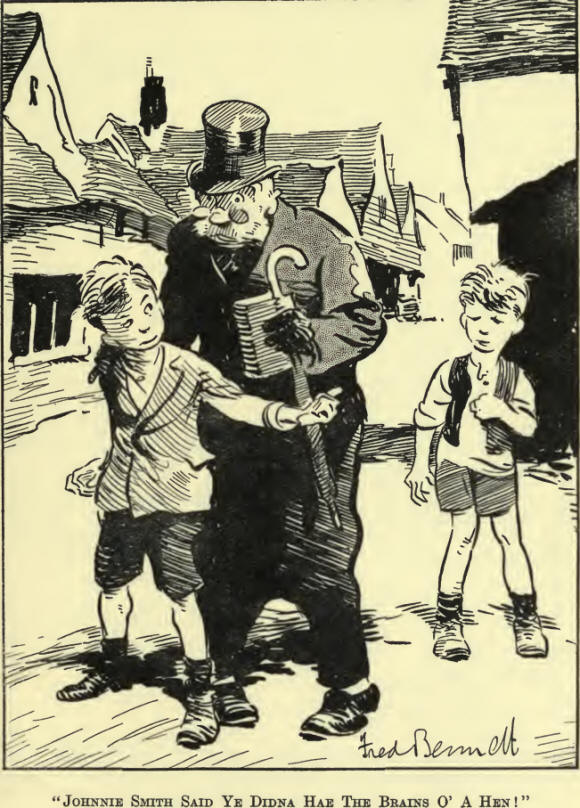
Ministers as a class, and owing to the frequency of
their public appearances, are subject to a great
many unintended insults. These as a rule emanate
from the worthy chairmen in charge of the meetings.
Take the one about the congregational soiree for
instance. An interval for friendly conversation had
been arranged, and full advantage of it was being
taken. But the hour was getting late so the chairman
approached the minister. “Shall we allow them to go
on enjoying themselves or shall I announce your
address?”
And what do you think of this by way of an
invitation to address a meeting?
“We all hope you will come. You are sure of a grand
reception for we have never heard you speak!”
Or of this by way of thanks for an address?
“We have all been delighted with your address and
when you come back you’ll maybe give us something
better!”
ON DOING ONE’S BEST.
A
delightful story is told about a Paisley pastor.
He was walking down the street whistling away to
himself, when a wee laddie stopped him with the
remark—“Hey, minister, I can whustle better than
you.” “Can you my little man,” replied the minister,
“let me hear you.” And the wee laddie whistled like
a lintie. “Well done,” said the minister, “but I can
whistle better than that.” “Can you though,” said
the laddie, “let’s hear ye.” And the minister
warbled like a lark, and when he had finished the
laddie looked up in astonishment and said—“If ye can
whustle like that, whit wey did ye whustle like
yon?”
That’s just a quiet hint that ministers should
always be on their best behaviour. And here is a
story that proves they should never interest
themselves in civil disputes.
THE WANT O’ SILLER.
The village worthy is fast dying out, but here and there recollections are still vivid of the quaint “sayings” of those simple souls. “Archie” is a case in point, and although mentally deficient, he could, on occasion, come away with very wise observations. He was once called upon to carry the luggage of a visiting minister from the station to the manse, and on the way the local clergyman remarked to his friend, “A great want there.” “Aye!” said Archie turning round, “the want o’ siller!”
THE FIDDLER’S WIFE.
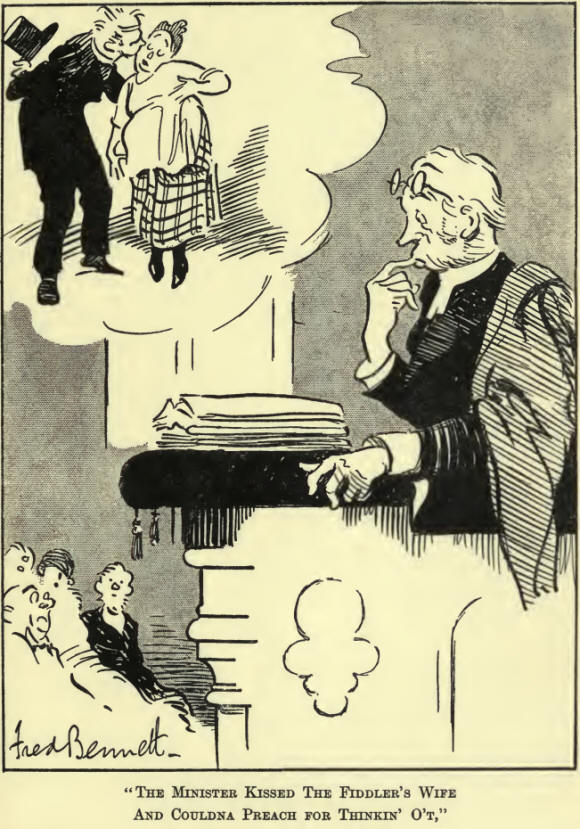
In addition to his satires of them Burns had many a sly dig at ministers. Think of the humour he gives us in the couplet:
“The
minister kissed the fiddler’s wife,
And couldna preach for thinkin’ o’t.”
Suppose your own minister had been guilty of that
indiscretion, what would he have done on the Sabbath
day when the recollection came into his mind in the
pulpit? Suppose the text was, “Greet each other with
a holy kiss.” He might get through, the first head
without noticing the coincidence; he might get
through the second head, but when he came to the
third head, another head, the head of the fiddler’s
wife, would come between him and his sermon. He
would stop short. The congregation would observe an
unusual comic expression on his countenance. He
would look at the manse pew, and thinking of the
contrast between the fiddler’s wife and his own, he
would smile outwardly, but he would not be able to
proceed. The only thing left for him to do would be
to announce the doxology—the most suitable for the
occasion, “Praise God from Whom all blessings flow.”
Of course one must not deduce from this that all
ministers who cannot preach have been guilty of
kissing fiddlers’ wives: that might be sound enough
logic but it would not be fair to the ministers. So
you see humour has its limitations.
BREAKING THE SABBATH.
The
Scot in general is credited with keeping everything,
especially the Sabbath.
Ministers used to be a terror to evil-doers in this
respect, but now and again the younger generation
rebelled, or found some conscientious way out, as
for instance the story of the little boy who had
been absenting himself from the services one Sunday,
and was returning home with a good catch of trout on
a string.
Meeting the minister he got in with the first word
to some effect “See what these trout have got for
nibblin’ bait on the Sabbath Day!”
FAIR RIDICULOUS.
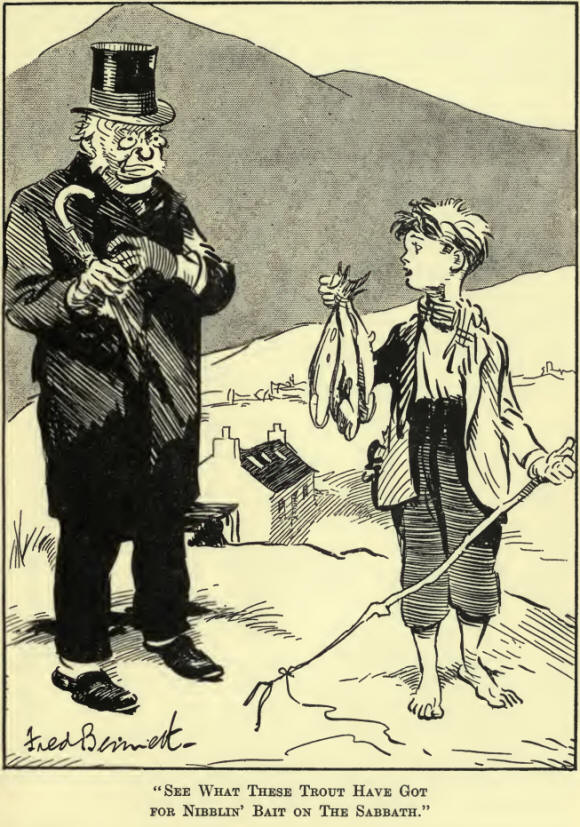
Scotland in the olden days possessed ministers who with much reverence adopted a very familiar attitude towards the Deity in the matter of prayer, and a story goes to the effect that on the occasion of a prolonged drought a worthy clergyman was praying earnestly for a change in the weather conditions, when a sudden storm broke over the district, and in the middle of his prayer the windows blew in. The reverend gentleman however went on unperturbed, and much to the amusement of his congregation said, “Oh Lord; this is fair ridiculous!”
STRUCK BLIND.
It is
on record that a worthy elder of the old strictly
calvinistic type was very much against the new
inventions that were changing the customs of the
people; his main contention being that they were not
mentioned in the Bible.
For this reason he had a great antipathy to railways
and nothing would entice him to travel on a train.
At last, after a great deal of persuasion he boarded
a local train to Glasgow, and all the way sat in
imminent dread of some judgement of Providence.
As the train moved through the tunnel in Glasgow he
was heard to remark “There you are, I kent something
awfu’ would happen, I’ve been struck blind!”
A TERRIBLE LOSS.
The best time for a good laugh is after a good lunch. Of course there are exceptions to this rule. I am reminded of this by a story told of a Perthshire minister. One of his members had lost his wife and some days after the funeral the minister called to sympathise with the widower. “Aye” the poor man said, “it’s a terrible loss, Sir. I’ve been greetin’ a’ day and as sune’s I get my denner, I’m tae begin again.”
DISTRICT VISITATION.
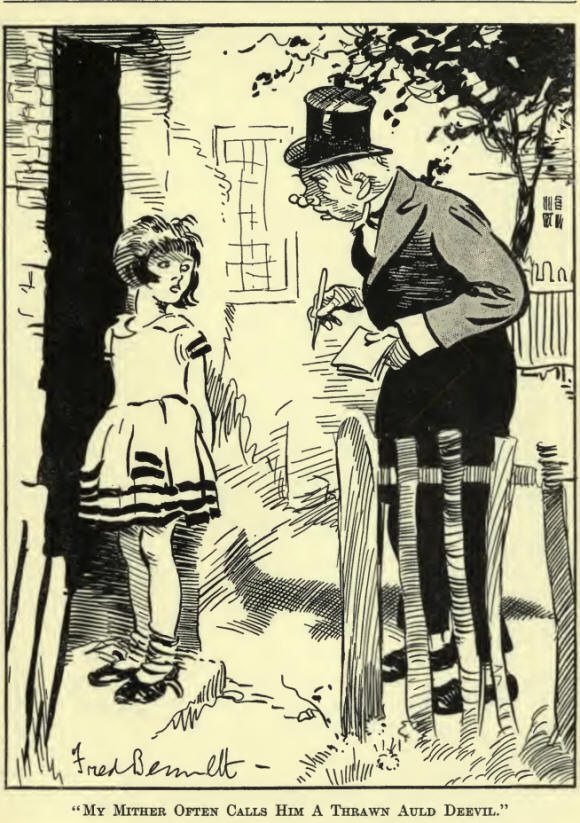
Very
amusing experiences fall to the Elder who undertakes
what is termed “a special visitation” of his
district.
This generally involves calling at every house to
enquire as to the place of worship attended by the
householders.
One man I heard of lately, owned up to no church
connection, but he admitted “The Parish Church is
the one I don’t go to.” Rather a negative way of
putting it!
WHAT MOTHER CALLED FATHER.
A
session-clerk in the course of his visitation,
describes how on knocking at a certain door he was
answered by a little girl.
“Is your father in?” he asked.
“No, he’s oot, he’s on the nicht shift.”
“Is your mother in?” he further enquired.
“No, she’s oot tae.”
“Well” he remarked, “tell me your father’s name.”
“Smith” replied the little girl.
“And his other name: what do you call him?”
“Faither.”
“Of course you call him father, but I want his other
name. What does your mother call him?”
“My mither often calls him a 'thrawn auld deevil.’”
He had to go with that.
A DICKY AND CUFFS.
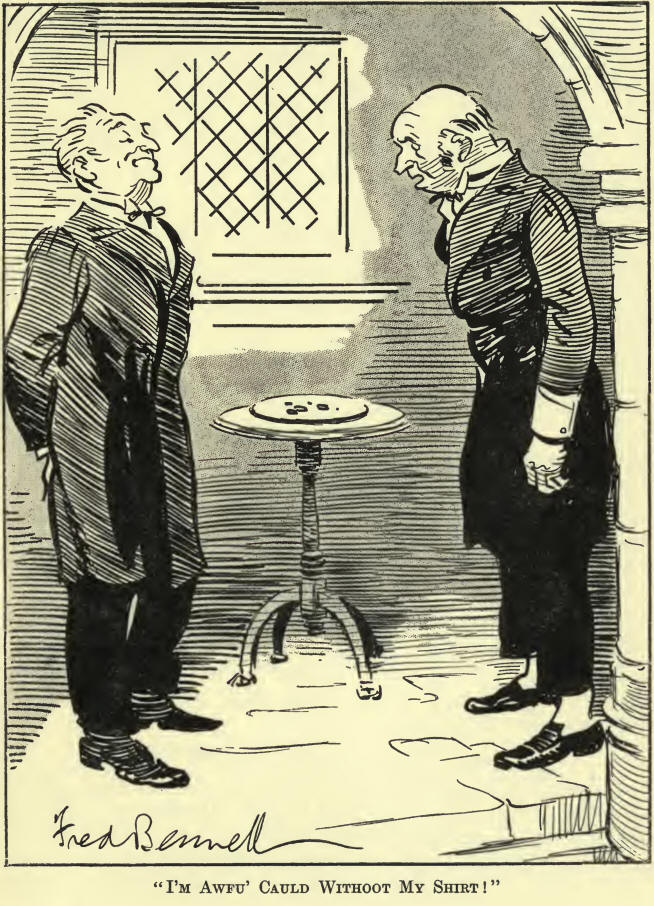
Elders are drawn from all ranks of society, and in
many instances men gifted with little of the world’s
wealth are gifted in other ways and are the glory of
the church.
In a certain parish one of the new elders happened
to be a very poor man, and appeared “at the plate”
for the first time, with a coloured shirt instead of
the customary white one. His fellow-elder took note
of this, and remarked, “Ye canna stand at the plate
Dauvit, wi’ a coloured shirt on—ye’ll hae to get a
white ane!”
“But I canna afford a white shirt ” replied Dauvit.
“Weel then” said his friend, “you should get a dicky
and a pair o’ cuffs.” “I might manage that” replied
Dauvit, and on the occasion of his next day at the
plate his friend noticed the change in his attire.
“That’s better Dauvit,” he remarked “how dae ye
feel?”
“I feel a’ richt,” was Dauvit’s reply, “but I’m awfu’
cauld withoot my shirt!”
NOT TO EDIFICATION!
Sometimes the sense of humour holds a man in good
stead, especially when dealing with the different
personalities in a kirk session. For example, a
certain court of which I was once a member had under
consideration the question of a successor to the
minister who had just left for another sphere.
Several names were being considered, but it looked
as if a deadlock had been reached, the more so as
the Moderator’s nominee was not accepted.
The discussion ultimately became very heated, and
was on the point of becoming disorderly when the
Moderator chimed in with—“Gentlemen this is not to
edification!” His remark had the desired effect:
order was restored, and his nominee got a hearing.
HERE ENDETH THE SECOND LESSON.
The minister of another parish found out that when the weather was bad the service as a rule was attended only by one of his flock—the Laird of the Manor. On these occasions however the Laird was never in time for the first part of the service, the reason being that the minister watched for his coming, then slipped over to the church, got into the pulpit, and as the Laird entered began with, “Here endeth the second lesson.”
“SWEETHEARTS!”
Again, ministers are often humorous without meaning to be. Like the pastor who in praying for the young men of his congregation, expressed himself in these words—“Lord, give them pure hearts; give them clean hearts. Yea, Lord, give them sweet hearts.”
IN THE WRONG TRAIN
A story is told to the effect that some time ago a supporter of a Dundee Football Club had been in Perth seeing his team play. He had imbibed rather freely, with the result that he had got to the wrong platform and boarded a train for Aberdeen. Just as the train was about to start a ticket collector appeared and informed him that he was in the wrong train. He got out and hurried to the Dundee platform, but just as he entered the carriage a minister who was seated in the compartment observed,—“Young man you’re on the way to h—1!” “Confound it!” he replied as he sprang out of the carriage, “in the wrang train again!”
“COME AWA’ IN, SIR.”
Much
of what passes for pawky humour in the Scot is
nothing more nor less than an endeavour to make the
best of an awkward situation—a kind of sly diplomacy
mingled with native wit. We have a fine illustration
of this in the following story.
The ruling elder had been at a friend’s
house-warming, and was returning home with just a
little more than a drappie in his e’e, so much so
that when he met the minister, that reverend
gentleman decided it would be an act of Christian
charity to see his elder home. So they set off arm
in arm. Ultimately they reached the little cottage
on the hillside, and the minister was for leaving
when John dragged him back with the remark. “Come
awa in Sir, and let the wife see wha I’ve been wi’
th’ nicht!”
If there is any humour here it lies, not in the
remark itself, but in the sudden and unexpected
denouement.
It was John’s one hope of instant reconciliation
with his wife, and I have no doubt, it was well
thought out as he stumbled home with the aid of his
friend.
NOT A BEAUTY.
The
arrival of a new minister is always a great event in
country districts and for some time he is the chief
topic of conversation. A story has it that two
worthies were once discussing the latest arrival in
a certain village. “Hae ye seen the new minister,
Bella?”
"Aye,” replied Bella, “I saw him passin’ and he
looks as if he’d fa’en aff the back o’ a flittin’.”
TWO TRAM STORIES.
Sometimes ministers, just like the rest of us, get
all their thanks in one day. A clerical freend of
mine happened to be travelling in a Glasgow tram
car. It was crowded, but he managed to get a seat at
the very end.
By and bye a drunk man entered, and staggering up
between the passengers came to a standstill beside
him. My friend felt very uncomfortable and at last
rose and gave the man his seat. But all the thanks
he got was "Thank ye, Sir,—I see ye ken what it is
tae be drunk.”
Which reminds me that even professors are subject to
the attentions of tipsy men. An Edinburgh tram car
is responsible for this story.
One of the passengers had been partaking rather
freely of the barley bree, and was in a fine
conversational mood. You know the way of some men in
drink? Eyeing a well-known professor, he addressed
him with,—“Some fowks think they ken an’ awfu’ lot.”
The professor said nothing so the man went on:—“I
was saying, some fowks think they ken an awfu’ lot.”
But still he got no answer. And then setting himself
down by the professor’s side he remarked:—“I suppose
you think you ken an awfu’ lot, but I ken mair than
you. My wife’s your wife’s washerwoman and I’m
wearin’ ane o’ your shirts.”
NOT HIS HAT.
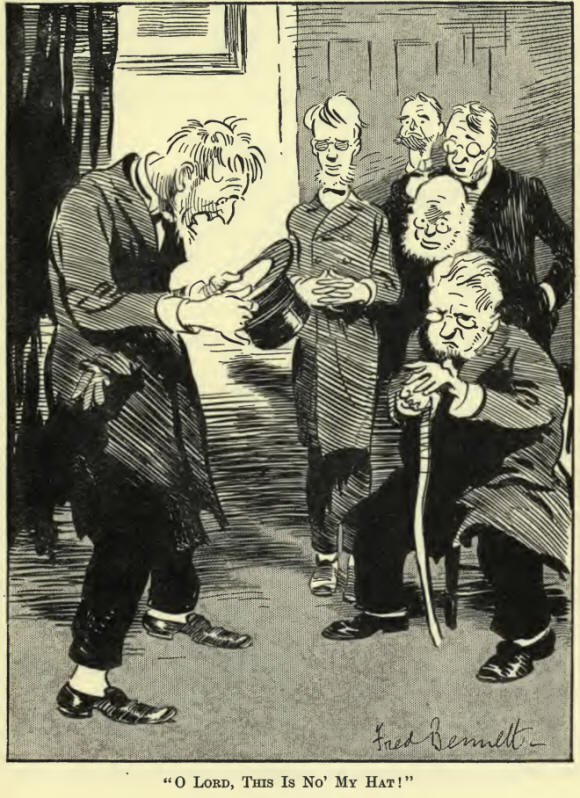
Elders are not spared so far as the humorists are
concerned and some of the best stories are told
against them.
Geordie McLaren is a case in point. After a great
deal of persuasion, he at last consented-to become
an elder, but for many a long day, he lived in
perpetual dread of being called upon to pray in
public. At last he hit upon the plan of writing out
a prayer and sticking it in the crown of his lum
hat, so that it would be ready in an emergency. The
anticipated occasion arrived at a funeral, where the
minister was suddenly called away. “Mr McLaren will
take my place,” he remarked, as he left, and then
one of the mourners went up and asked Geordie to
“pit up a bit prayer.” “Oh! but I’ll dae that,”
replied Geordie, and going to the lobby, took down
what he imagined was his own hat. Proceeding to the
dining-room, where the company was assembled, he
reverently said, “Let us pray,” and suiting the
action to the word, turned up his hat, but all that
the mourners heard was the despairing cry.— "0 Lord,
this is no’ my hat.”
IT’S YER FAITHER.
Which
reminds me that questions of theology are sometimes
discussed by the bairns. A wee Scotch lassie asked a
wee laddie, “Dae ye believe in the Deevil, Tam?”
“Ach, no,” replied Tammie, “it’s juist like Santa
Claus; it’s yer faither.”
OOR JOCK’S MOOTH.
Another fine story is told about a Glasgow
Sunday-School. The superintendent was addressing the
school on “The Omnipotent Power of the Almighty.” At
the close of his remarks he said; “If there is any
boy or girl present who thinks there is anything the
Almighty Power cannot do—let him raise his hand.”
Promptly a wee hand went up. “Well boy,” said the
superintendent, “what is there that the Almighty
Power cannot do?”
“Please Sir,” came the answer, “the Almighty Power
couldna’ mak’ oor Jock’s mooth ony bigger, withoot
shiftin’ his lugs.”
PREACHING VERSUS PRACTICE.
The
question of preaching versus practice, is as old as
the race itself, but it has been left to the
Scottish clergy to reconcile the two in a manner of
their own. This is finely illustrated in the
following conversation between two elders.
“That’s an awfu’ noise I hear in the Manse every
Saturday nicht, Dauvit. D’ye think there’s onything
wrang?”
“Man, that’s a’ you ken. It’s the minister practicin’
what he’s to preach on the Sunday!”
IN “THE DAILY NEWS”
Then
there is the delightful story of the minister, who
presuming on the Divine interest in every detail of
life, included in his morning prayer :
“0 Lord as thou hast doubtless read in yesterday’s
Daily News!”
WHAT SIN WAS!
A certain minister of an ultra-calvinistic turn of mind was anxious to learn what his beadle thought of his preaching, and ventured to question him on the subject, but the reply he received left him thinking. “Weel Sir” said the beadle, “to be perfectly frank ye canna haud the can’le tae our last man, but we never kent what sin was till you cam’ to the parish.”
LIKE ANE O’ OORSEL’S.
By
reason of their popularity some ministers become
very conceited but sometimes they are brought down
to earth.
A friend of mine in the west of Scotland was one of
the chaplains of the local mental hospital. Walking
down the drive one day he was stopped by an inmate
with—“Excuse me, Sir, are you Mr ?” “I am.” “Well
then I would like to tell you that we like you
better than all the other ministers.” “And how is
that?”
“Because you speak to us like ane o’ oorsel’s!”
THE FALL OF MAN.
Sermons come in for a great deal of criticism and
some of it is very much to the point.
The sermon had been about the “Fall of Man.” Two
farmers met at the end of the service:
“Weel, Dauvit,” asked Tammas, “and what did ye think
o’ the sermon?”
Dauvit replied: “Oh, the sermon was a’ richt, but I
was juist thinkin’ what a difference it wad hae made
to the history o’ the world if I’d been in Adam’s
place, ye see I dinna gi’e a hang for aipples.”
Which after all is just the Scot’s way of putting
the epigram:
“This world would be devoid of ill And Eden had been
with us still If Eve had only said ‘I can’t’ And
Adam had been adamant!”
THE BEADLE KNEW THEM.
Congregations are credited with being rather afraid
of the minister, but it is not so widely known that
sometimes the shoe is on the other foot.
A young country minister was exchanging pulpits with
a popular city preacher. When the beadle entered the
vestry to show him into the pulpit, he asked very
timorously—“Is there a big congregation?” The
beadle, thinking he would be pleased, replied:—“Aye
Sir, the place is packed.” “Dear me!” replied the
minister, “I feel quite nervous!”
“Hoots man,” said the beadle, “that’ll never dae. If
ye kent them a’ as weel as I ken them, you wadna
gi’e a hang for ony o’ them!”
FOR THE SICK.
The English language has its limitations and young folks are to be forgiven for sometimes misunderstanding its meaning. For instance, little Johnnie Paterson took ill in church and turning round to his mother whispered: “I’m no’ feelin’ very weel Ma.” “Are ye no’,” said his mother, “juist rin away hame at the next hymn.” Johnnie slipped out but returned in a few minutes and sat down beside his mother. “Whit wey did ye no’ gang hame?” she asked. “Oh,” he replied, “there’s a box at the door labelled ‘For the Sick.’”
THE PRODIGAL SON.
Recognising these limitations a minister in a
Highland charge adopted the habit of localising his
illustrations, but the laughter following his local
application of the prodigal son cured him. It was as
follows:
"Rory" More of the Clachan had two sons. Donald was
a quiet stay-at-home lad, and helped his father on
the farm. Tammas was a restless loon, and wanted off
to see the world. So he went away to Glasgow. In a
few days he had spent the five shillings his mother
had given him, and he was on the rocks. So he pawned
his overcoat, and then he pawned his jacket. When
the money was all gone he pawned his waistcoat, and
then he pawned his shirt, and then he came to
himself.”
THE SAME TO YOU!
New
Year’s Day in Scotland is an occasion for friendly
felicitations, and as a rule these are generally
reciprocated with the formal "same to you.”
Now and again however this formality produces
unlooked-for results, as in the story of the
minister who greeted his beadle with a
not-altogether complimentary wish:—
"A good New Year to you John, and I hope you’ll keep
more sober this year than last.”
But he was unprepared for John’s reply:—
"I thank ye Sir—The same to you Sir!”
A PLEASANT TIME.
Great
amusement is to be had at times from the intimations
of lectures as for instance that delightful
announcement of the opening of the P.S.A. It read as
follows:—
You are heartily invited to the opening meeting of
the Pleasant Sunday Afternoon when Rev. James Neil
will give an address on “The Tortures of the
Damned.”
Brief! Bright! Brotherly!
Then there is the report of the closing of a church
"Yesterday the services in Belmont Chapel were
conducted by a student from Edinburgh College. The
building is now closed for repairs.”
JUST A BLOOMING CIRCUS.
Sometimes in a congregation there are a number of
“coarse” Christians, and ministers have to put up
with them as best they may. It was a country parish
and the husband of one of his members had met with a
fatal accident so the minister was called upon to
break the sad news.
Knocking gently at the door he was called upon to
“Come in!” and in he went. “Oh! it’s you Sir,” the
widow remarked and dusting a chair with her apron
asked him to be seated.
The reverend gentleman was as tender as he could
possibly be in narrating the details of the sad
occurence which had bereft her of her husband.
Then she blurted out with stoical indifference in
the face of calamity—“Juist that, Sir, juist
that—life’s just a blooming circus—here th’ day an’
awa’ the morn.”
FALLING FROM GRACE.
In
these days ministers visits are not attended by the
same solmenity as formerly. The Shorter Catechism
used to be much in evidence and questions on
doctrine were frequently put. The story goes that on
one occasion the minister put a question to Mrs
Blair—
“Ah by the way, Mrs Blair do you believe in the
doctrine of 'Falling from Grace.’”
“I dae that Sir,” was the ready reply “and what’s
mair, I practise it!”
IN CLOSING
Let
me say “that will be all for the present”: which
reminds me of one more story.
A certain young man was engaged to be married. He
did not care about facing up the minister alone, so
he got his mother to accompany him. She was very
deaf, but at length everything was satisfactorily
arranged. There was a lull in the conversation, and
taking advantage of it to bring the interview to an
end, the minister said:—“Well I will bid you good
night, that will be all for the present.”
When they reached the street the old lady turned to
her son and asked, “Whit wis that he said aboot a
present?”
